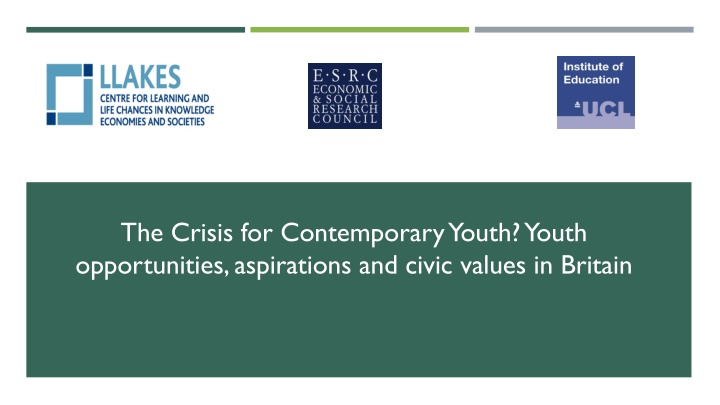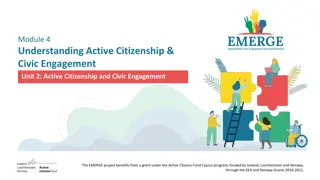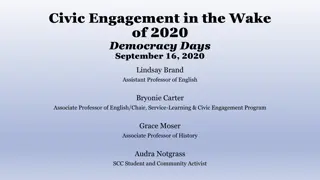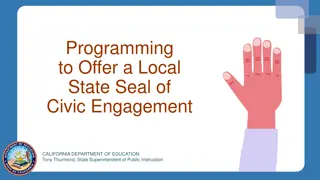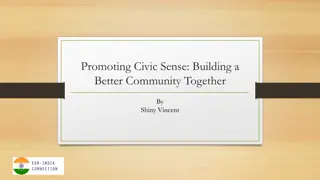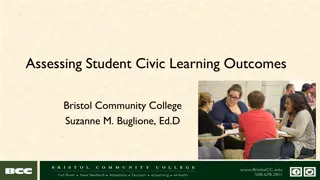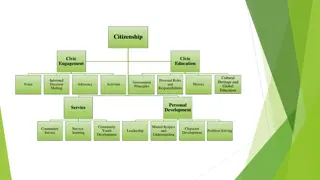The Crisis for Contemporary Youth? Youth opportunities, aspirations and civic values in Britain
This presentation delves into the crisis faced by contemporary youth in Britain, exploring issues such as intergenerational inequalities, youth aspirations, and civic values. The research aims to analyze the differences in education, employment, and housing opportunities for today's youth compared to previous generations. It also investigates youth attitudes and aspirations, particularly in terms of political engagement, tolerance, and trust. The project involves a multi-source, mixed-method approach, including quantitative and qualitative data from interviews and surveys with young adults.
Download Presentation

Please find below an Image/Link to download the presentation.
The content on the website is provided AS IS for your information and personal use only. It may not be sold, licensed, or shared on other websites without obtaining consent from the author.If you encounter any issues during the download, it is possible that the publisher has removed the file from their server.
You are allowed to download the files provided on this website for personal or commercial use, subject to the condition that they are used lawfully. All files are the property of their respective owners.
The content on the website is provided AS IS for your information and personal use only. It may not be sold, licensed, or shared on other websites without obtaining consent from the author.
E N D
Presentation Transcript
The Crisis for Contemporary Youth? Youth opportunities, aspirations and civic values in Britain
Dominant debates in the UK Youth = the subject of much debate and concern Much focus on growing inter-generational inequalities how Baby Boomers have stolen the Millennials future Often overlook intra-generational inequalities and overlook how many contemporary youth may have moreopportunities than their parents did (especially young women) We are seeking to address both issues and to explore the implications for youth civic attitudes
Research themes and aims of todays presentation The book aims to examine a range of issues, including: the extent to which the education, employment and housing opportunities for contemporary youth differ from those available to previous generations of youth Whether, and how far these represent genuine intergenerational (life course) declines in some domains Youth attitudes and aspirations - particularly in terms of political engagement, tolerance and trust Present the key findings here today brief, and at times overly simplistic.
Project team Andy Green Avril Keating Michela Franceschelli Germ Janmaat Bryony Hoskins Rachel Wilde Pauline Leonard Gabriella Melis With additional support from: Golo Henseke, Nic Pensiero, Helen Cheng
Multiple data sources and mixed method project Quantitative Data Qualitative Data 100 semi-structured interviews with 18-26 years old in England Original analysis using LFS, WVS, BSA, BHPS and Understanding Society, etc Including 17 from a participatory action research strand Original cross-sectional data: web survey in GB of youth attitudes and opportunities 2025 young people in GB age 22-29 In-depth Interviews: opportunities in education, work and housing & civic values views of society Original longitudinal data: Citizenship Education Longitudinal Study (CELS) of young people in England - 6 waves (aged 12, 14, 16, 20, 23)
Do contemporary youth really have fewer opportunities? EDUCATION, EMPLOYMENT AND HOUSING
Expanding opportunities for continuing education Young People participate longer in education and training and gain higher qualifications than their parents generation, but they are not more literate or numerate. Highest Qualifications by Age Cohort Barriers to aspiration have reduced, particularly for girls and minorities. Social gaps in attainment at upper secondary level have reduced, and the distribution of qualifications has narrowed, but skills distributions have scarcely narrowed and social gaps in skills are much larger amongst younger than older people. ISCED 1 or below ISCED 2 20-24 ISCED 3-4 50-54 ISCED 5 and above 25-29
But qualifications worth less in the labour market Young people have more qualifications at upper secondary and tertiary levels but the status of these qualifications is more differentiated and their value on the labour market less certain. Occupational destinations of graduates by age 28-32 69% 63% Over-qualification: at each level of qualification young employees are more likely to be overqualified for their jobs than before. 15% 12% 9% 9% Professional, Managerial, Associates & Technical Clerical and Craft Semi & Unskilled & Other Source: LFS 1992, 2015 1992 2015
Employment more jobs, worse work? The bad news for young people in their 20s in the UK The good news for young people in their 20s in the UK More under-employment/over-qualification Unemployment rates for 16-24 year olds rebounding from the nadir in late 2011 Increase in young male and female employees working part-time (LFS) 13.6% in 2016 v 22.5% in 2011 More are in precarious employment (i.e. underemployed, on temporary or zero hour contracts) particularly amongst 20-25s and the least qualified. (LFS) 20-29 yr olds who have left FT education are less likely to be unemployed now than in 1984 Real earnings static or declining (for 18-21s) since late 1990s and falling further behind earnings for older age groups Improving opportunities for young women (although many of the gains in the 1980s and 1990s)
Housing one of the biggest areas of change Living arrangements of 20-29 year olds (%) 1993 2003 2013 41 40 37 31 29 29 21 21 16 14 11 10 Owner Live w/ Parent(s) Private renter Social renter
Housing Changing patterns of tenure amongst young people: declining home ownership, more staying living with parents, or renting privately. Opportunities for home ownership likely to continue to weaken as house price to incomes ratios go on rising and increasing rents makes saving for mortgage deposits harder. At the same time the cost and insecurity of private renting increases. By 2012 67 percent of all private renters spent more than 30 percent of their income on housing, and 36 percent spent more than half (Howker and Malik, 2013). The median private rental tenancy lasts 1.7 years compared with 7.1 years for owner occupiers and 7.8 yrs social renters (Dorling, 2014). Some parent gift homes to their children, but growing housing assets of older generation will not compensate as many spend the inheritance to fund retirement or care (Willetts, 2010).
Delayed transitions or intergenerational decline? In GB, it depends which domain you consider Education: Opportunities for young people in GB have improved but this is not necessarily translating into better job prospects. Work: Increasing polarization amongst young people who are at the sharp end of globalisation. No evidence to suggest overall life course intergenerational decline, although those with lowest qualifications may well do worse than similarly qualified parents throughout the life course. In GB, seems to be mostly a question of delayed transitions and increasing inequalities within and between age groups. Housing: Projecting from recent trends, it looks likely that most of Generation Y in GB will fare worse than their parents over the life course, although opportunities here still remain socially differentiated.
In tandem, continued concern about youth disengagement from politics. But this issue not limited to 18-24 year olds 100 90 80 70 70 60 50 40 40 30 20 10 0 1964 1966 1970 1974 (a) 1979 1983 1987 1992 1997 2001 2005 2010 2015 18-24 25-34 35-44 45-54 65+
And the voting gap is not new. % Voting (self-reported, British Election Study) 15 16 12 17 19 8 10 10 26 8 0 15 19 1964 1966 1970 1974 (a) 1979 1983 1987 1992 1997 2001 2005 2010 2015 Over 25 Gap Under 25
Fewer voting, but still the most common means of political engagement Have you ever.... (% yes) 48% Voted in a local or national election 43% Signed a petition 18% Joined/ followed a campaign group on social 15% Boycotted a business, product or brand 15% Followed or 'Liked' a politician on social media 12% Contacted a local councillor or MP 10% Taken part in a public demonstration /protest 3% Used a social network site to start a campaign Source: CELS cross-sectional web survey of 2025 young people aged 22-29 in England, Scotland and Wales, June-July 2014
Particularly striking given the prominent role of youth in public demonstrations elsewhere I just think a lot of protests tend to go wrong. [Even] the most peaceful protest, they still seem to end up with somebody injured or . Even a peaceful protest, like I say, I don t think they re civilised. They start off civilised and there s always going to be somebody that .because even if it s people that disagree with what you re protesting for, they can change it all for you in minutes. So I d never take part in one. Jess (female, qualified nurse, Yorkshire) Fear was recurring theme in our in-depth interviews Not just fear for personal safety, but also of the implications it may pose for their career Not just fear of other protesters, but also of the police
Not taking to the streets, but shifting their ire to immigrants instead? How much it would bother you to have the following groups as neighbours ? People who speak a different language 20 24 Immigrants/foreign workers 18 19 People of a different religion 12 13 People of a different race 11 13 % A great deal/ Rather a lot % A little Source: CELS cross-sectional web survey of 2025 young people aged 22-29 in England, Scotland and Wales, June-July 2014
Why? Long-term changes in attitudes and norms - Contemporary youth more accepting of racial and religious diversity; changing social norms prohibit expressing racial/ religious prejudice; anti-immigrant sentiment = more accepted. Explicit anti-immigrant attitudes linked to: Economic threat (personal and national) Cultural threat In addition (and more) widespread Good Immigrants versus Bad Immigrants Perceptions of The Immigrant = very negative (poor, low skilled, language-issues) The Good Immigrant = wants to work hard, make a contribution
The Good Immigrant is acceptable, even to those who are very opposed to immigration I just feel that some of them don t come over here to work. I can understand if you re coming over here, you re going to get a job no problem, I don t have a problem with that. But when you re coming over here just to reap the reward of the benefit system and take the piss really, then I don t think it should be allowed. Frank, young, White British male, working in a high-skilled manual job, South of England If you re going to come here and you re going to work, you re going to work damned hard to send money back to your family, do it, do it, go ahead. But if you re coming to have 20 kids and sit in a 3-bedroomed house with 20 of you on my taxes, then I don t see why you should [be allowed to] really. Kelly, a young White British woman, working + studying in the East of England
Key civic value = the importance of hard work? Source: CELS web survey 2014, 2025 young people age 22-29 from England, Scotland and Wales (weighted) Please tell me how important you think it is for getting ahead in life ? Hard work 10 86 Having ambition 11 85 Having a good education yourself 14 81 Knowing the right people 20 75 Having wealthy / well-educated parents 45 49 A person's race 73 20 A person's gender 76 17 A person's religion 79 14 % Essential/ very important % Not very/ at all important
May explain why young Britons remain remarkably optimistic about their own future, despite having concerns about their generation as a whole I am optimistic that there will be plenty of opportunities for me in life 54 17 47 30 I feel confident that in time I will be able to buy my own home 46 20 I expect to end up in a better job than my parents had It is easier now for people like me to get on and improve things for themselves than it was for my parents 39 26 My generation will have less opportunities than my parent's generation 43 23 33 35 I don't expect to ever be able to afford my parent/s lifestyle % Agree % Disagree
Rashid, young British Pakistani male, studying for a degree I d say I m pessimistic about everything else but optimistic about my future. If I work hard enough I can achieve everything I want to achieve there s no point in getting hung up on things that you can t sort of change really.
Conclusions More opportunities in some areas, less in others especially housing More opportunities, but fewer returns (except for a small minority) Civic values changing but lack of opportunities does not seem to be inspiring a political protest in the public domain Instead, witnessing a turn to the self: Belief in the importance and efficacy of Hard Work a narrative for guiding their own lives, but also a civic value that shapes understandings of who should be included and who should be excluded
